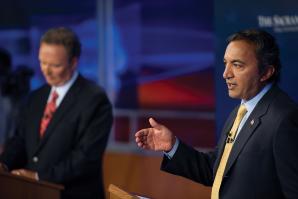In the weeks since the election, I have felt like a stranger in a foreign land. My own cherished beliefs about the benefits of balanced budgets, lower taxes and free enterprise don’t seem to be shared by a majority of my fellow citizens.
At the national level, voters gave control to a president and Senate who helped create a deficit larger than any since the period after World War II. Within weeks, we’ll face the so-called fiscal cliff, billions in year-end spending cuts and tax increases that could push the country back into recession. To avoid falling over that precipice, our highly partisan Congress must find some path to compromise.
At the state level, Democrats achieved a two-thirds supermajority in both houses of the legislature for the first time since 1933. With it, they can pass tax increases, override the governor’s veto and even change the state constitution.
Plus, voters passed Proposition 30, Gov. Brown’s bill to raise more than $6 billion annually, mainly by raising income taxes on the top 1 percent of earners. This is a step backward. The best tax system is one of low rates applied to a large base of earners. California already relies too heavily on taxing the wealthy.
At the city level, Sacramento voters approved a sales tax hike that brings with it the dubious distinction of achieving the highest sales tax in the region, putting many businesses at a competitive disadvantage.
Where does this leave those of us who believe such wrong-headed actions point only to further financial disaster?
We can’t simply give up and retreat to our own circle of like-minded friends and colleagues. Nor can we indulge in nostalgic longing for the good ol’ days (which probably weren’t ever as good as they seem in memory).
We need to press our political leaders at all levels to get off their partisan hobby horses and solve the problems.
We can begin by building relationships with moderate Democrats who have shown support for business-friendly measures, such as those who called on Gov. Brown to pull back on costly environmental regulations.
We can lobby and work closely with the legislature to make difficult changes that could truly improve our state, like restructuring the tax code, for example.
We can be diligent in monitoring the restraint Gov. Brown has promised to practice in using our increased tax dollars.
In Sacramento, we can hold city leaders to their promise to use the additional $28 million a year in tax revenue to restore the most important services cut during these past recessionary years: police officers, fire rigs and park maintenance.
None of those new tax dollars should be used to provide more generous staff salaries and benefits. We should especially watch spring contract negotiations with police and firefighter unions to be sure Sacramento holds the line on labor costs.
And as the economy recovers, we should pressure city leaders to end the sales tax hike in four years (as Prop. 30 does) rather than the current six years.
Though I am discouraged by the recent election results, I cannot allow myself to become disheartened — nor can you. We must become more active than ever before, serving as watchdogs and advocates for the smaller government we believe is right for the country, our state and our region.
Recommended For You

GOP on Deck
Can the Republican contenders overcome Brown in 2014?
With just over a year until the midterm elections, California’s next gubernatorial race is starting to take shape.

Is Sacramento Permanently Democratic?
Voter trends with lasting effects
The 2012 election may have spelled the end for a 30-year boomlet of Republican legislative and congressional representation in Sacramento.



